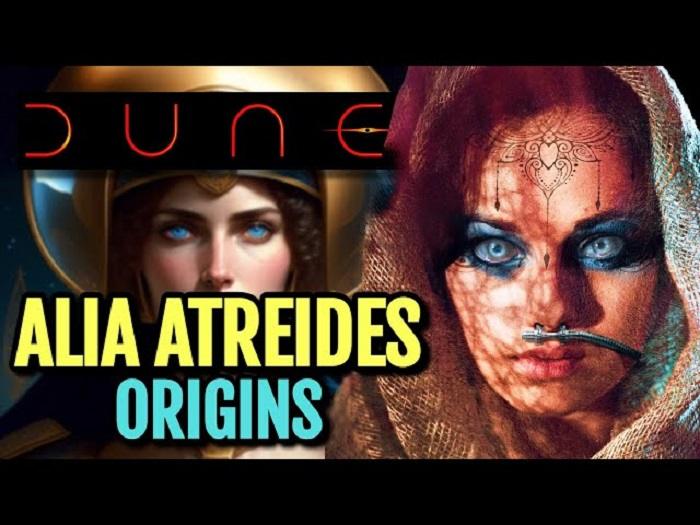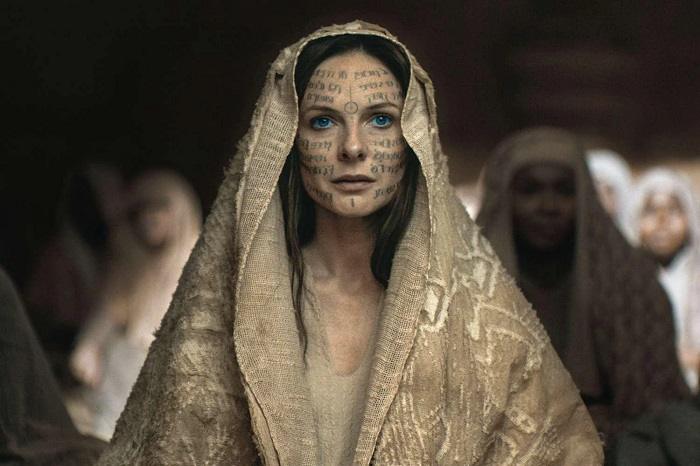The Dune series by Frank Herbert is one of the most influential works in science fiction literature. The saga, spanning several books, explores themes of politics, religion, and human evolution on the desert planet of Arrakis. Among the rich tapestry of characters in the series, Paul’s sister, Alia Atreides, stands out as a complex and compelling figure. Born into a tumultuous time, Alia’s life, career, and influence extend far beyond her immediate family and into the broader universe of Dune. This blog post takes a comprehensive look at her character, exploring her life story, her pivotal role in the series, and her lasting impact on the Dune universe.
Early Life and Background
Alia Atreides was born into the House Atreides, a noble family in the universe of Dune. Her parents, Duke Leto Atreides and Lady Jessica, were central figures in the political and social upheavals that shaped the story of Dune. Alia’s conception and birth were anything but ordinary. Her mother, Jessica, a member of the secretive Bene Gesserit sisterhood, defied her order’s instructions and bore a son instead of a daughter, altering the course of history. When Jessica became pregnant with Alia, she was already undergoing the ritual known as the Water of Life, which transformed her into a Reverend Mother. As a result, Alia was exposed to the consciousness and memories of her ancestors while still in the womb, making her a “pre-born” — a unique condition with profound implications.
Unique Abilities and Characteristics
Alia’s status as a “pre-born” granted her abilities and knowledge far beyond her years. From birth, she possessed the memories and experiences of countless generations of Bene Gesserit Reverend Mothers. This gave her an immense advantage in terms of wisdom and understanding, but it also came with significant risks. The condition of being pre-born made Alia vulnerable to the voices and personalities of those within her, threatening to overwhelm her identity. This inner struggle is a central aspect of her character throughout the series, as she battles to maintain control over her own mind and spirit.
Alia also inherited the physical and mental training of the Bene Gesserit. She was a skilled fighter, possessing the martial prowess necessary to defend herself and those around her. Her prescient abilities, although not as developed as her brother Paul’s, allowed her glimpses into the future, making her a formidable political and strategic thinker.
Role in the Dune Saga
Alia Atreides plays a crucial role throughout the Dune series, especially in the books Dune, Dune Messiah, and Children of Dune. As a child, Alia is thrust into a position of power and responsibility following the rise of her brother Paul as the Emperor of the known universe. She becomes a symbol of the Atreides’ power and a key player in the unfolding political drama.
In Dune Messiah, Alia’s character takes on a more active role as she helps navigate the treacherous waters of court politics. Her abilities and her unique status as a pre-born make her both a valuable asset and a potential liability. She is deeply loyal to her brother and the Atreides legacy, but her internal struggles with the personalities within her begin to manifest, hinting at the difficulties she will face in the future.
By the time of Children of Dune, Alia has grown into a powerful and charismatic leader, serving as Regent for her young nephew Leto II and niece Ghanima after Paul’s apparent death. However, the pressures of leadership and her internal battles with the ancestral memories drive her towards a darker path. Her descent into madness and eventual possession by the consciousness of her grandfather, Baron Vladimir Harkonnen, is one of the most tragic and compelling arcs in the series.
Influence and Legacy
Alia’s influence on the Dune universe is profound. Her life is marked by extraordinary challenges and choices that have far-reaching consequences. As a symbol of the Bene Gesserit’s genetic experimentation and the Atreides’ complex legacy, Alia represents the intersection of fate, free will, and the dangers of power. Her story is a cautionary tale about the perils of prescience and the human struggle to maintain identity in the face of overwhelming internal and external pressures.
Alia’s tragic arc also serves to highlight the broader themes of Dune: the complexity of political and religious authority, the unpredictable nature of human evolution, and the ethical dilemmas posed by genetic manipulation and foresight. Through her character, Frank Herbert explores what it means to be human in a universe where power and knowledge are often in conflict with individual freedom and identity.
Alia’s Relationships
Alia’s relationships with other characters in the Dune saga are complex and multifaceted, reflecting her unique position within the Atreides family and her struggles with her inner demons. Her bond with her brother Paul is particularly significant. As children, they share a deep connection forged through their shared heritage and the harsh realities of life on Arrakis. Paul’s transformation into the messianic figure Muad’Dib and the Emperor strains this relationship, especially as Alia grapples with her own identity and the expectations placed upon her.
Alia’s relationship with her mother, Jessica, is also fraught with tension. Jessica’s decision to bear a daughter instead of a son, defying the Bene Gesserit breeding program, set the stage for Alia’s existence and her pre-born condition. While Jessica loves her daughter, she is often torn between her duties to the Bene Gesserit and her loyalty to her family, complicating her interactions with Alia.
Romantically, Alia’s most significant relationship is with Duncan Idaho, the Atreides swordmaster and ghola. Their union is marked by both passion and tragedy, as Duncan becomes increasingly aware of Alia’s descent into madness. His attempts to save her and his ultimate decision to leave her highlight the personal toll of Alia’s internal battles and her failure to control the darker impulses within her.
The Tragic Downfall
Alia’s downfall is one of the most poignant aspects of her story. Her inability to suppress the voices of her ancestors, particularly the malevolent influence of Baron Harkonnen, leads her into a spiral of paranoia, violence, and ultimately, madness. This descent is exacerbated by the political pressures of her regency and the expectations placed upon her as a leader and a symbol of the Atreides’ power.
Her tragic end — a suicide precipitated by her realization that she cannot escape the possession of the Baron’s consciousness — is a stark reminder of the series’ broader themes of power, corruption, and the loss of self. Alia’s death is not just a personal tragedy but also a turning point in the saga, marking the end of an era for the Atreides family and setting the stage for the rise of her nephew Leto II and the transformation of the universe under his rule.
Alia’s Influence on Subsequent Generations
Even after her death, Alia’s influence on the Dune universe continues to resonate. Her life serves as a warning to subsequent generations of Atreides and others who seek power in the Dune universe. The consequences of her actions and the legacy of her choices affect the paths taken by her nephew Leto II and niece Ghanima, shaping the future of the Atreides line and the broader political landscape.
Leto II, in particular, learns from Alia’s mistakes, using his prescient abilities to guide humanity onto the Golden Path, a plan designed to ensure humanity’s survival against stagnation and extinction. Alia’s struggle with the internal and external forces that sought to control her serves as a critical lesson for Leto II as he contemplates his own path and the sacrifices required to achieve his vision.
Alia in Adaptations and Popular Culture
Alia Atreides has been portrayed in various adaptations of Dune, including the 1984 David Lynch film, the 2000 Sci-Fi Channel miniseries, and most recently, Denis Villeneuve’s film adaptations. Each portrayal brings different aspects of her character to the forefront, from her eerie maturity as a child in Lynch’s film to the deeper exploration of her inner turmoil in the miniseries.
In popular culture, Alia’s character has become a symbol of the dangers of power and prescience. Her unique abilities and tragic story arc have made her a compelling figure for fans of the Dune series, often serving as a subject for discussion and analysis regarding the series’ themes of identity, control, and destiny.
Related Post:
Mor Shapiro: A Comprehensive Look at the Life, Career, and Influence of a Prominent Public Figure
Ruby Guest: The Life and Legacy of a Remarkable Individual
Reacher Season 3: What to Expect from the Latest Installment of the Hit Series
Alia Atreides is one of the most intriguing and complex characters in the Dune series. Her life, marked by extraordinary abilities, inner conflicts, and a tragic downfall, offers a rich narrative that explores the themes of power, identity, and destiny that are central to Frank Herbert’s universe. Through her story, readers are invited to contemplate the balance between fate and free will, the costs of power, and the eternal struggle to maintain one’s sense of self against overwhelming odds. Alia’s legacy continues to influence the Dune universe, reminding us of the intricate and often perilous nature of human ambition and the search for meaning in a vast and unforgiving cosmos.




